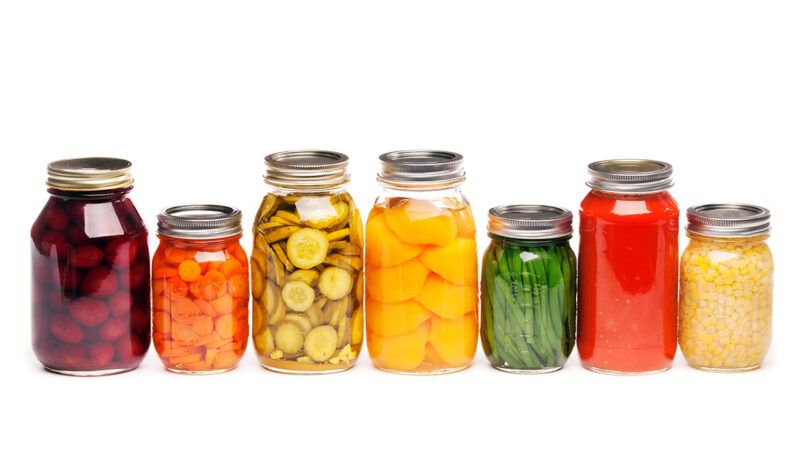Preserve Your Sanity by Preserving Food
Canning is a hedge against uncertainty, an education in self-reliance, and a pocket of calm amid tumult.

While eating from cans is far from my preferred sustenance, putting my own food into them for later consumption is a different matter. Throughout 2020—a year we could have skipped—my family took to home-canning food even as we expanded a garden that we hope will provide us with more to store. It's a means of armoring ourselves against a world that seems determined to throw every possible challenge our way and of turning our focus from insane headlines to comforting home activities.
For us, a big spur was the supply disruptions, when chicken, ground beef, canned goods, and other foods disappeared from markets and were rationed when available. We got in the habit of grabbing and storing goods as they appeared. But the chest freezer has limited capacity. And what do you do with a bonanza of apples for sale at 19 cents a pound?
One thing we could do with those apples, we remembered, was make apple butter and can it for future use. That is, if we could find the requisite materials.
My wife and I had dabbled in canning, but long enough ago that we were caught scrambling for high-demand supplies like everybody else when COVID-19 and then summer unrest revived interest in food preservation. While many people searched high and low for reusable jars and single-use lids, we were lucky to find a supply of pint and quart containers locally.
The big score came when, on a hunch, I popped into a supermarket in an area transitioning from small ranch properties to suburban development. Sure enough, the chain's distribution algorithms were a bit behind the times, and the store's food-preservation section was a treasure trove. We ended up with an assortment of jars from big-name makers Kerr and Ball and even some lids from Canada's Bernardin. Those brands are all owned by the same parent company, and their components are interchangeable.
Our stock pot was perfect for water-bath canning of tomato sauce—basically, ladling sauce into jars, popping lids on, and immersing them in boiling water for the time prescribed by the recipe. But water-bath canning works only for high-acid foods like pickles and spaghetti sauce to which you've added a healthy dollop of citric acid.
Our apple butter probably could have been water-bathed, but we preferred the greater safety of pressure canning. That process is necessary for any meat product, such as the chili and lamb stew that we simmered up to free space in the freezer and to have shelf-stable meals ready to go. So we broke out our 16-quart pressure canner/cooker, adjusted the process for our altitude, and filled the kitchen with cooking odors.
To avoid a DIY health emergency in an already interesting time, we pulled instructions from the University of Georgia's National Center for Home Food Preservation website, the Ball Complete Book of Home Preserving, and Diane Devereaux's The Complete Guide to Pressure Canning, among other resources. Even if you've canned before (or learned from Grandma), it's worth checking out the most current information. Research and experience have refined home preservation in ways that sometimes make it less tricky than in the past.
Canning isn't our only means of smoothing out bumps caused by supply disruptions. An unexpected oversupply of tomatoes, halved, seeded, and spread on screens, dried in no time for future use in salads, sauces, and gazpacho. We gave similar treatment to most of our basil once the first frost rolled in. It wasn't my first experience with dried herbs, but it was definitely the tastiest. To make sure we wouldn't have to buy everything we cooked and canned in the months to come, my son and I knocked together raised beds to expand the garden we panic-planted last spring.
All of this effort gives us a sense of self-reliance in an uncertain era. That's not the same as complete autonomy, which is unrealistic. But a bit of do-it-yourself security is reassuring when times are tough. Cooking, preserving, and gardening are enjoyable for us too. The necessary effort and focus become a bit zen as they consume our attention and take our minds off the world's troubles. And what a good year to distract ourselves from the worries of the moment by preparing a well-fed future.


Show Comments (35)